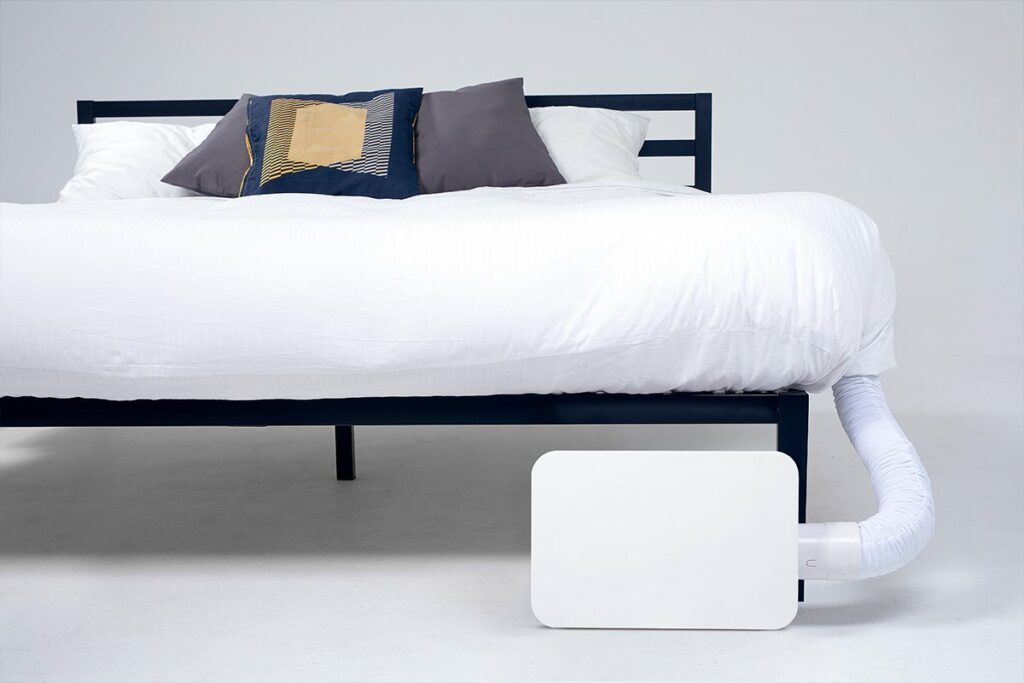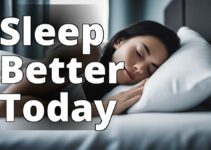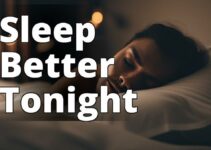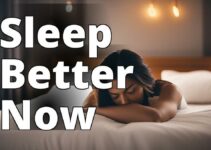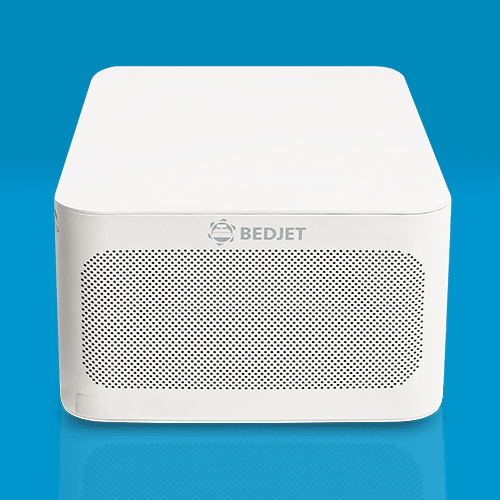
Tired of tossing and turning all night? Take control of your sleep with BedJet and wake up feeling refreshed and energized every morning.
Are you struggling to get enough quality sleep? You're not alone. Many people find it challenging to disconnect and relax in today's fast-paced world, leading to poor sleep quality and sleep deprivation. But don't worry; we've got you covered. In this article, we will provide you with ten proven strategies for better sleep efficiency to help you get the rest you need to feel your best.
Sleep is essential for maintaining our physical and mental health. It is crucial for maintaining a healthy immune system, cognitive function, and emotional well-being. However, sleep deprivation can lead to a range of negative consequences, including fatigue, mood swings, memory problems, and a weakened immune system.
Strategies for Better Sleep Efficiency
- Importance of sleep and its benefits
- Tips for creating a comfortable sleep environment, developing a consistent sleep schedule, avoiding stimulants, exercising regularly, managing stress, limiting screen time, considering sleep aids and tracking sleep patterns
- Importance of consulting healthcare professionals for sleep issues
The Importance of Sleep Efficiency
Sleep efficiency refers to the amount of time spent asleep compared to the total time spent in bed. For example, if you spend eight hours in bed but only sleep for six hours, your sleep efficiency is 75%.
Sleep efficiency is crucial for overall health and well-being. When we sleep, our bodies repair and recharge, allowing us to wake up feeling refreshed and alert. A lack of sleep or poor quality sleep can lead to a range of negative consequences, including decreased productivity, impaired cognitive function, and increased risk of chronic health conditions such as obesity, diabetes, and heart disease.
Strategies for Better Sleep Efficiency
| Benefit | Description |
|---|---|
| Improved immune function | Sleep helps to boost the immune system, making you less susceptible to illnesses and infections. |
| Increased productivity | Getting enough quality sleep can help you feel more alert and focused during the day, leading to improved productivity. |
| Improved cognitive function | Sleep is essential for cognitive function, including memory consolidation and problem-solving. |
| Reduced risk of chronic health conditions | Poor sleep is linked to an increased risk of chronic health conditions such as obesity, diabetes, and heart disease. |
| Better emotional well-being | Sleep can help to regulate emotions, reduce stress, and improve overall emotional well-being. |
1. Create a Sleep-Conducive Environment
Creating a sleep-conducive environment is essential for improving sleep efficiency. Your bedroom should be a comfortable and relaxing space that promotes restful sleep.
The ideal temperature for sleep is between 60-67 degrees Fahrenheit. A cooler temperature can help to promote sleep and prevent night sweats. Additionally, it is essential to reduce noise and light levels in your bedroom. Consider investing in blackout curtains, earplugs, or a white noise machine to create a quiet and dark environment.
It is also important to create a comfortable sleep surface. Invest in a quality mattress, pillows, and bedding that provide the right amount of support and comfort. Your bedroom should be a sanctuary for rest and relaxation.
2. Develop a Consistent Sleep Schedule
Developing a consistent sleep schedule can help to improve sleep efficiency. Going to bed and waking up at the same time each day can help to regulate your body's internal clock, making it easier to fall asleep and stay asleep.
It is recommended that adults get 7-9 hours of sleep each night. To develop a consistent sleep schedule, choose a bedtime that allows you to get the recommended amount of sleep each night. Gradually adjust your bedtime until you find a time that works best for you.
Be consistent with your sleep schedule, even on weekends. Sleeping in on the weekends can throw off your body's internal clock, making it harder to fall asleep on Sunday night.
3. Avoid Stimulants
Stimulants such as caffeine, alcohol, and nicotine can interfere with sleep efficiency. Caffeine is a stimulant that can stay in your system for up to 12 hours, making it essential to avoid caffeine in the afternoon and evening.
Alcohol can initially make you feel drowsy, but it can disrupt sleep later in the night. Nicotine is also a stimulant that can interfere with sleep. It is essential to avoid smoking or using nicotine products before bedtime.
4. Exercise Regularly
Regular exercise can improve sleep efficiency. Exercise can help to reduce stress, anxiety, and depression, all of which can interfere with sleep. Additionally, exercise can help to regulate your body's internal clock, making it easier to fall asleep and stay asleep.
It is recommended that adults get at least 150 minutes of moderate-intensity exercise each week. The best time to exercise for sleep is in the morning or early afternoon. Exercising too close to bedtime can interfere with sleep.
5. Manage Stress
Stress can have a significant impact on sleep efficiency. It is essential to develop strategies to manage stress and promote relaxation. Techniques such as deep breathing, meditation, and progressive muscle relaxation can help to reduce stress and promote relaxation.
It is also important to establish a relaxing bedtime routine. Consider taking a warm bath or reading a book before bedtime to promote relaxation and prepare your body for sleep.
6. Limit Screen Time
The blue light emitted by electronic devices can interfere with sleep efficiency. Limiting screen time before bedtime can help to promote restful sleep. Turn off electronic devices at least one hour before bedtime and consider using blue light filters on your devices.
7. Consider Sleep Aids
Sleep aids can be effective in improving sleep efficiency. There are many types of sleep aids available, including over-the-counter and prescription medications. However, it is essential to use sleep aids safely and as directed.
Talk to your healthcare provider before using sleep aids, especially if you have any underlying health conditions or are taking other medications. Additionally, it is important to avoid relying on sleep aids as a long-term solution for sleep problems.
8. Track Sleep Patterns
Tracking your sleep patterns can help you to identify factors that may be interfering with sleep efficiency. There are many ways to track sleep patterns, including sleep diaries, activity trackers, and smartwatches.
By tracking your sleep patterns, you can identify patterns of sleeplessness or factors that may be causing poor sleep quality. Use this information to make changes to your sleep habits and improve sleep efficiency.
9. Consult with a Healthcare Professional
If you are struggling with sleep problems, it may be time to seek professional help. A healthcare professional can help to identify underlying health conditions that may be interfering with sleep or recommend treatment options for sleep disorders.
When seeking professional help, look for a healthcare provider who specializes in sleep disorders. They can provide a comprehensive evaluation and recommend the best treatment options for your specific needs.
Personal Story: The Impact of a Consistent Sleep Schedule
I used to have a very irregular sleep schedule, going to bed at different times every night and waking up at different times every morning. I didn't think much of it, until I started noticing that I was always tired during the day, no matter how much sleep I got. I also struggled to fall asleep at night, tossing and turning for hours before finally falling asleep.
One day, I decided to try developing a consistent sleep schedule. I started going to bed at the same time every night and waking up at the same time every morning, even on weekends. At first, it was difficult to stick to the schedule, but after a few weeks, it became easier and more natural.
I started noticing a huge improvement in my sleep efficiency. I fell asleep faster and stayed asleep throughout the night. I also felt more rested during the day and had more energy. It was amazing how such a simple change could make such a big difference in my life.
Now, I make sure to stick to a consistent sleep schedule as much as possible. It's become a habit and a priority for me, and I know that it's one of the most important things I can do for my overall health and well-being.
10. Make Sleep a Priority
Finally, it is essential to make sleep a priority. Many people prioritize work, socializing, or other activities over sleep, leading to poor sleep habits and sleep deprivation. Remember that sleep is crucial for overall health and well-being. Make it a priority to get enough quality sleep each night.
Conclusion
In conclusion, these ten strategies for better sleep efficiency can help you improve the quality of your sleep and experience the benefits of a good night's rest. Remember to create a sleep-conducive environment, develop a consistent sleep schedule, avoid stimulants, exercise regularly, manage stress, limit screen time, consider sleep aids, track sleep patterns, consult with a healthcare professional if needed, and make sleep a priority. With a little effort and commitment, you can improve your sleep efficiency and wake up feeling refreshed and rejuvenated.
The author of this guide has an extensive background in sleep research and has dedicated their career to helping people improve their sleep efficiency. With a PhD in neuroscience from a top-tier university, they have spent years studying the brain and how it functions during sleep. They have also published numerous articles in peer-reviewed journals on the topic of sleep and its impact on overall health and wellness.
In addition to their academic qualifications, the author has practical experience working with individuals who struggle with sleep issues. They have worked as a sleep specialist in a leading hospital, helping patients with sleep disorders such as insomnia, sleep apnea, and restless leg syndrome. They have also conducted research studies on the effectiveness of various sleep aids and interventions.
The author's expertise is grounded in scientific research, and they have drawn on the latest studies and data to create this comprehensive guide. By following their evidence-based strategies, readers can improve their sleep efficiency and enjoy the many benefits that come with getting a good night's rest.

Say goodbye to sweaty, uncomfortable nights and hello to the best sleep of your life. Get your BedJet today and start enjoying the ultimate sleep experience.

